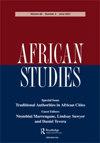Economic Anthropology
IF 1
4区 社会学
Q2 AREA STUDIES
引用次数: 0
Abstract
Anthropology has a long and complicated history in Africa, and its study of economic life is no exception. In the early days of the discipline, in the 1930s and 1940s, anthropologists like Audrey Richards, Meyer Fortes, and E. E. Evans-Pritchard all departed for Africa to conduct fieldwork. In general, early British social anthropology was committed to holistic studies of small-scale societies, and thus what counted as “economic anthropology” was subsumed within broader studies of kinship and sociopolitical organization. Though later criticized by Manchester School anthropologists for their “bounding” of specific peoples, and by Marxist anthropologists for their neglect of “modes of production,” from a contemporary vantage point these early studies made the same point that anthropologists working in the substantivist tradition of Karl Polanyi also would: that the economy is embedded in social relations and practices. The growing influence of Marxist approaches from the 1960s, as well as growing sympathies between social anthropology and the historical study of Africa, introduced an appreciation of historical processes in the formation of local and regional economies. Feminist approaches expanded the frame of inquiry by demonstrating the gendered character of African economic life, and of the crucial role of women and households to markets and production. New analytical tools borrowed from political economy paved the way for studies of colonial economies—for instance, how the emergence of cash crop production shaped labor migration and land ownership, as well as the shift toward cash itself. The contemporary anthropological study of economic life in Africa has been transformed by pressing events in the latter part of the century—structural adjustment and economic liberalization, not to mention scholars’ identification of the “informal economy”—as key terrain for anthropological research. New attentiveness has been given to how Africans imagine and conceive of economic change, as well as the new types of wealth, credit, and debt brought about via access to foreign capital. The era of economic liberalization has transformed cities and African expectations of the future, sometimes in terms of improved living standards and “middle class” lifestyles, but also a growing disparity between rich and poor. Moving away from the narrative of crisis, newer work seeks to explore African attempts to pursue “the good life” amid ongoing economic turbulence. While anthropologists remain attuned to the effects of economic change, what continues to characterize their approach is an understanding of economies embedded in regional contexts, including their values and established practices.经济人类学
人类学在非洲有着悠久而复杂的历史,其对经济生活的研究也不例外。在该学科的早期,即20世纪30年代和40年代,像Audrey Richards、Meyer Fortes和E.E.Evans Pritchard这样的人类学家都前往非洲进行实地调查。总的来说,早期的英国社会人类学致力于对小规模社会的整体研究,因此,所谓的“经济人类学”被纳入了对亲属关系和社会政治组织的更广泛研究中。尽管后来曼彻斯特学派的人类学家批评他们对特定民族的“边界”,马克思主义人类学家忽视了“生产方式”,从当代的角度来看,这些早期研究提出了与卡尔·波兰尼实体主义传统中的人类学家同样的观点:经济植根于社会关系和实践中。20世纪60年代马克思主义方法的影响越来越大,社会人类学和非洲历史研究之间的同情也越来越深,这使人们对地方和区域经济形成的历史过程产生了认识。女权主义方法通过展示非洲经济生活的性别特征,以及妇女和家庭在市场和生产中的关键作用,扩大了调查框架。借用政治经济学的新分析工具为研究殖民经济铺平了道路——例如,经济作物生产的出现如何影响劳动力迁移和土地所有权,以及向现金本身的转变。当代人类学对非洲经济生活的研究已经被本世纪后半叶的紧迫事件所改变——结构调整和经济自由化,更不用说学者们对“非正规经济”的认同——这是人类学研究的关键领域。非洲人如何想象和构想经济变化,以及通过获得外国资本带来的新型财富、信贷和债务,都受到了新的关注。经济自由化时代改变了城市和非洲对未来的期望,有时是生活水平的提高和“中产阶级”的生活方式,但也改变了贫富差距的扩大。摆脱了危机的叙事,新的作品试图探索非洲在持续的经济动荡中追求“美好生活”的尝试。虽然人类学家仍然适应经济变化的影响,但他们的方法仍然是对区域背景下的经济体的理解,包括其价值观和既定做法。
本文章由计算机程序翻译,如有差异,请以英文原文为准。
求助全文
约1分钟内获得全文
求助全文

 求助内容:
求助内容: 应助结果提醒方式:
应助结果提醒方式:


